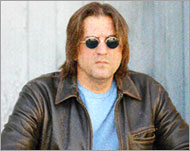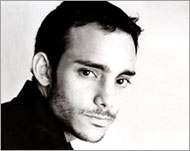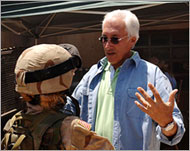The war in America’s living rooms
With the body count rising on all sides in Iraq, two Hollywood producers have charged ahead and created a TV drama that is as incendiary – and divisive – as the conflict it covers.

“It’s a massive failure of American journalism right now to bring us a sense of what is really going on in our name,” said writer-director Chris Gerolmo, one half of the team behind Over There, a 13-part ensemble drama following the lives of a group of US army soldiers on their first tour of duty in Iraq.
Gerolmo’s motivation for creating such a show – along with the opportunity to work with legendary NYPD Blue creator Steve Bochco – owes a great deal to this statement. And he is ready for the controversy that covering such an incendiary – and in America, divisive – issue will bring.
“I think it’s a writer’s obligation to write about the most important things you possibly can,” Gerolmo told Aljazeera.net, defending his right to dramatise the ongoing conflict.
“Controversy just comes with the territory when you write about serious subjects.”
War rages on
No newcomer to sensitive issues, Gerolmo’s screenplay for 1988’s Oscar-nominated Mississippi Burning tackled the issue of racism in the South in the 1960s.
But with Over There, is he now working too close to a fire still burning?
 |
|
Gerolmo says it is a writer’s duty |
“It’s certainly awkward trying to chronicle a war in progress,” says Brian Lowry, a television critic for Hollywood trade paper Variety.
“It does do a laudable job of providing a soldier’s view of the experience without taking a strong stand on the question of the war itself.
“It’s sympathetic to the American soldiers, being separated from their families and put in an extremely difficult position, but there’s nothing glamorous about the war as depicted here. Far from it.”
Not about foreign policy
Gerolmo says it was never his or co-creator Bochco’s intent to produce a show about policymakers.
“It’s about kids who get to carry out our policy, however misguided it might be.”
He adds that while both of them had strong feelings on the question of whether it was a good idea for the US to invade Iraq “we weren’t doing a show about that. We were doing a show about these kids trying to survive and the war is a fact in their lives.”
“These are not a bunch of kids who talk about American foreign policy all the time.”
Variety’s Lowry told Aljazeera.net: “It’s almost impossible to be apolitical in this context, but it mostly succeeds on that level. There’s surely a sense of hopelessness about the war
that kind of permeates the series, but that’s not an overt thing, more of a subtle aspect to it.”
The soldiers
The characters in question make up an eclectic unit. Apart from a battle-hardened sergeant, played by Erik Palladino, they are all in their late teens or early twenties and new to combat.
As the show cuts between Iraq and the United States, developing multiple storylines, the soldiers’ lives are shown from many angles, with their occasional phone or video calls back home humanising them as they deal with the same domestic issues that everyone faces: being apart from a spouse, being absent in a child’s life, coping long-distance with ailing parents.
In one storyline, Lombardo Boyar plays a husband who finds himself the only man at a support group for soldier’s spouses when his wife ships off for Iraq, leaving him to care for their young son.
Possibly the most complex of the soldiers is Avery King, played by Keith Robinson. King is a devoutly religious man whose crushed dream of becoming a professional singer was in part his motivation for signing up.
Crisis of faith?
The irony that King is also an expert marksman, and is often called upon to take the fatal shot, makes his struggle with his faith even more pronounced.
King’s journey is not helped by his antagonistic relationship with Maurice “Smoke” Williams (Kirk Jones), a former gang member from South Central LA who tries and fails to bring his fellow African-American into an us-and-them situation with the white soldiers.
 |
|
Omid Abtahi, of Iranian descent, |
Williams’ prejudice raises its head once again when Tariq Nassiri, an Arab-American soldier played by Omid Abtahi, joins the unit.
Omid Abtahi, an American who is actually of Iranian descent and had to brush up on his Arabic for the character, plays Nassiri as a man who is fighting for one country, while sharing a religion with those he is fighting against.
Gerolmo says the Nassiri character allowed the writers to explore areas that might otherwise have been impossible for them to delve into, with Abtahi’s character often serving as a cultural translator for his fellow soldiers, not to mention the American viewers.
“None of us have been through a war so none of us know what these guys go through,” says Abtahi who has a better understanding than most about life in the army because his brother served in Afghanistan.
“But I thought [making this show] was actually a good thing because I think a lot of Americans forget there is a war going on because it’s being fought overseas,” he told Aljazeera.net
Gerolmo concurs.
“When the war on Iraq was on the cover of Newsweek their sales were down 35%. People are hell-bent on ignoring the war.”
Opposition
Despite Gerolmo’s best efforts, there are those who do not share the same enthusiasm for the show.
John Henry is a former marine whose son recently returned from Afghanistan.
“To have a network show a drama when [soldiers are] still in action is completely without integrity,” says Henry. “I have a real objection of them dramatising what may or may not be going on.”
 |
|
Bochco (R) focused on soldiers’ |
Henry now runs a non-political organisation in Sacramento, California, which helps returning soldiers deal with war-related post traumatic stress disorder and he says his view shared by many of the veterans he works with.
The content of the show is not the issue, he explains, but he is critical of it on principle.
While Gerolmo says he is not a big fan of those in the higher ranks of the military, or American politicians in general, he says that he is firmly behind the soldiers who are “doing our dirty work”.
“I think the fact that so many people are bent on ignoring them is just appalling.”
Even-handed?
But for actor Rami Malek, his role in the war-time drama gives him the opportunity to tell the other side of the story.
“I wanted to make sure the story, the side of the Iraqi people, was being noted by the people in this country,” he said.
American-born Malek, whose parents are Egyptian, plays a resistance fighter who is captured and then interrogated by Abtahi’s character, the only Arabic-speaking member of the unit.
“I wanted to take a life of someone there and show the people here [in America] something that is not savage. I wanted to bring it close to them, what these people are going through, they’re human.”
Malek’s powerful performance in his featured episode more than backs up his claim, although looking over the entire series, if Over There works as a drama it is simply because it does not pretend to give anything other than an American perspective on the war.
|
|
|
Malek plays an Iraqi resistance |
This is an American show aimed at Americans. But with foreign rights already sold to 14 countries – many in Europe and South America – Gerolmo is excited to see the reaction outside of the US, noting that particularly in Europe the war in Iraq has always been viewed very differently than it has in his own country.
Initial ratings domestically were very strong, although whether a second series will be forthcoming is yet to be determined.
Gerolmo says the current television landscape is littered with below par dramas, and believes if people are angry about Over There then at least he has managed to get them talking about the Iraq war.
“This is what I think television is supposed to do,” he told Aljazeera.net.
“I think television is supposed to bring the world into your room in all its ugly glory. We are trying to do something. Whether we’re succeeding is another matter, but we’re trying.”
